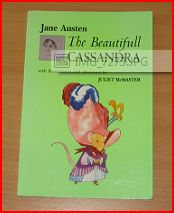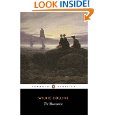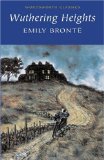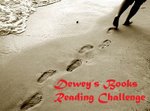
The Try Something New Mini-Challenge is hosted by Nymeth from Things Mean a Lot. It is part of the Dewey’s Books Challenge, hosted by Chris and Robin in Dewey’s memory,
The idea was to step out of your comfort zone and try something new. I teamed up with Rebecca from Rebecca Reads. As we both have an aversion to science fiction, we decided to read Foundation by Isaac Asimov. Her mini-challenge post is here.
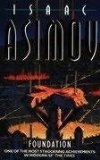

Unfortuantely, neither of us liked the book at all! We somehow managed to get through to the end, and answered a few questions about it:
What were your initial impressions of the book?
Rebecca: I do not normally choose science fiction to read, but after some good experiences last year when my husband and I read Dune and Space Odyssey 2001 together, I came to appreciate it. I have of course heard of Isaac Asimov, so I was expecting Foundation to be a great example of the master of science fiction. From the beginning of my reading, however, I was disappointed by just about everything — the writing, the development, and the general plot.
Jackie: Initial impressions were quite good. After the first few pages I was wondering what I had against science fiction. The character of Gaal was great. I loved his reactions on arriving at the planet of Trantor, everything was so new and exciting to him. I was willing to forgive all the irritating references to three-dimensional newscasts and plasto-textiles, as his awe and emotions shined through.
What did you like the most about Foundation?
Rebecca: I really liked the premise of Foundation. It is that in a far future era, psychohistorians are able to mathematically predict the future. When they predict the downfall of the empire, they determine to shorten the length of barbarian ignorance by preparing the scenario to their advantage. This concept had potential, and as I read, I sought for themes, as I did when I read Dune and subsequently reviewed it. Foundation encourages us to avoid being too comfortable with the status quo, to be careful to always be learning, to use your strengths to your advantage. These are universal themes to some extent.
Jackie: The picture on the cover of my book was beautiful!
Was there anything that particularly irritated you in the book?
Rebecca: It seemed to me that Asimov’s brilliant ideas fell far short of their potential. Asmiov wrote Foundation at age 21, apparently, and it feels amateur. The novel was divided into five sections of between 45 and 120 pages, and each section covered a separate setting in the midst of a 300-year history. Thus, just as I finally was understanding each personality and setting, it would shift to an entire new setting. I never felt completely comfortable with the characters and setting because I never had time to.
But even if Asmiov had developed each setting further, I doubt they would have felt familiar by the end because Asmiov’s writing was superficial: there was absolutely no development of anyone or thing. Things happened. People spoke. That was it. In the court room scene in section 1, the inquisition is told in a Q and A format. This was horrible to read in that it was boring and weak. While the rest of the book never resorted to that format, it felt the same.
Jackie: Half of Part II, and Parts III, IV and V!! (for those of you who don’t know Foundation is divided into five separate short stories – parts I – V). I loved the first story (Part I) but after that the book went downhill very quickly for me. I’m not very interested in the politics of my own country, so the arguing of Galactic Councils, which don’t even exist, seemed really pointless to me. I was interested in the book, while it concentrated on individuals, but once it started waffling about alternative power sources, regulations and trade agreements l lost interest.
Who was your favourite character and why?
Rebecca: I don’t have a favourite character because I felt Asimov never developed any character to any extent. They were all superficial and boring. If there is any section I wanted to know more about, it was the first one. The concept of psychohistorians (mathematicians predicting the future based on human character) was intriguing.
Jackie: Gaal was my favourite character by a long way, as he is the only one we really saw a human side too.
Will you be reading the rest of the trilogy?
Rebecca: No. I can’t imagine it being prolonged into two more books!
Jackie: No, I won’t be reading the rest of the trilogy, or any more books written by Asimov. There are so many amazing books out there, that I don’t see the point of reading ones which I probably won’t like.
The Dewey Mini-Challenge was to “try something new,” and science fiction was out of your comfort zone. What is your “after” impression of the genre? Will you be reading more in the future?
Rebecca: In addition to Dune and Space Odyssey 2001 as I mentioned above, I’ve also read Ender’s Game. Of those four science fiction books, Foundation was my least favourite. I liked the others much better, so I can’t swear off science fiction forever. That said, I may try Asimov again in the future to give him the benefit of the doubt, but not any time soon!
Jackie: I had a strong suspicion that I wouldn’t enjoy Asimov, and this was proved to be correct. In the past I have read a few science fiction/fantasy books, for example some by David Gemmel and The Fellowship of the Ring, but I haven’t enjoyed them. It obviously depends on your definition of science fiction, as it could be argued that The Time Traveller’s Wife also falls into this category, and I loved that. I much prefer books which are based in fact – only a really talented writer can make me enjoy books which are pure fantasy – Murakami is a good example of this. I need to be able to empathize with the characters, and this is much harder for me to do if they are living in a world in which all our laws of physics and society are different to theirs.
I’d like to thank Rebecca for participating in the challenge with me. I hope we can read a more enjoyable book together one day!

![]() (for the illustrations)
(for the illustrations)